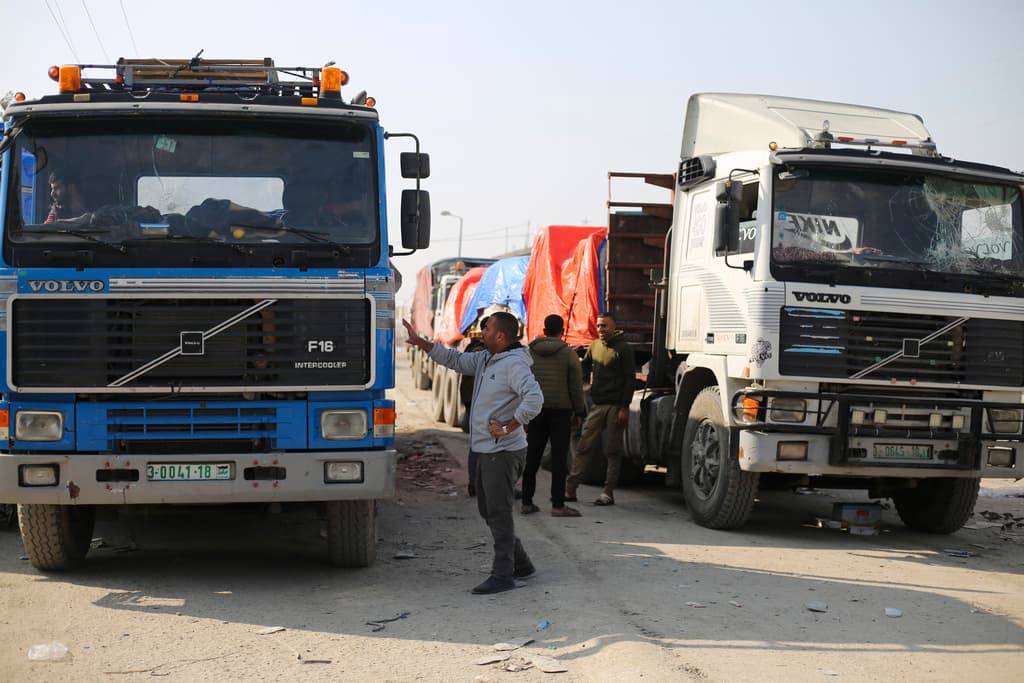Some Israelis Question Whether Any Assistance Should Reach Gaza During the War
A former head of Israel’s national security council, Giora Eiland, asks, ‘Once aid gets into Gaza, who distributes it?’ He says Hamas decides what gets to civilians in need, and how much goes to its own fighters.

Under American pressure, Israel is increasingly raising the amount of humanitarian aid it allows into Gaza. Yet, some Israelis doubt the wisdom of letting any assistance reach the Strip during a military campaign to dismantle Hamas’s control of it.
On Sunday, the Israel Defense Force’s Cogat unit, which coordinates humanitarian aid, announced the opening of the Kerem Shalom crossing for the first time since the start of the war. Until now, all international aid entered through Egypt’s Rafah crossing, where an average of 100 trucks could enter the Strip daily.
Kerem Shalom is a wider entry point than Rafah, and Israeli inspectors can more quickly search aid trucks there. The United Nations, humanitarian groups, and, crucially, Washington have long urged Israel to allow the crossing to open to enable more goods to reach the Strip and avoid a humanitarian catastrophe.
On another front, the CIA director, William Burns, met at Warsaw on Monday with his Mossad counterpart, David Barnea, and Qatar’s prime minister, Mohammad bin Abdulrahman al Thani, to renew negotiations over release of some 135 hostages held in Gaza.
Perhaps to indicate new terms, Hamas released a hostage video of three elderly men Monday, demanding Israel end the Gaza war if it wants them released. That is a nonstarter for Israel. “No new deal is expected in the immediate time frame,” the national security council’s spokesman, John Kirby, said.
Late last month, Israel agreed to pause the Gaza campaign as part of a deal to allow for the release of 110 women and children held hostage. In return, three times as many Palestinian terrorists were released from Israeli prisons. More crucially, Jerusalem changed a prior policy that banned some aid items from entering Gaza.
Then, even after Hamas stopped releasing hostages and combat resumed, aid continued to get in through Rafah.
“It is illogical that we should pass humanitarian aid, when even the agreement which we signed for visits from the Red Cross and the passage of testimonies regarding hostages who are still alive are things which we have not received to this day,” a Knesset member from Prime Minister Netanyahu’s Likud party, Danny Danon, told Channel 12 television.
“We must apply more force and be less humanitarian,” Mr. Danon, a former ambassador at the United Nations, added. Yet, America is insisting that aid must increase, and that Israel distinguishes between ordinary Gazans and the terrorists.
“Protecting civilians in Gaza is both a moral duty and a strategic imperative,” the American secretary of defense, Lloyd Austin, said Monday during a press conference at Tel Aviv alongside his Israeli counterpart, Yoav Gallant.
“This is Israel’s operation, and I’m not here to impose deadlines or tactics,” General Austin said, insisting he didn’t go to Israel to micromanage the war. To the contrary, “it’s critical that Hamas not be able to threaten Israel from Gaza, or even threaten Gaza anymore,” he said, adding that all hostages must be freed.
“I have a lot to learn from General Austin,” Mr. Gallant, himself a former general, said in a nod to his guest’s experience as leader of America’s war against ISIS in Iraq and Syria. Yet, some Israelis doubt that his experience is relevant to the Gaza war.
“This equation, Hamas is ISIS, is widely made both in America and Israel,” and it’s wrong, a former head of Israel’s national security council, Giora Eiland, tells public broadcaster Kan. ISIS, he notes, was a fanatic, ragtag group of foreigners from across the Muslim world that largely imposed itself on Iraqis and Syrians.
Hamas, in contrast, is native to the Palestinian territories, where, as a recent poll indicates, it enjoys wide local support. “Once aid gets into Gaza, who distributes it?” Mr. Eiland said, adding that Hamas decides what gets to civilians in need, and how much goes to its own fighters.
If no aid gets in at all, Gazans would direct their anger at the terrorists who have ruled Gaza since 2007, Mr. Eiland, a former IDF major general, said. In the initial hostage deal, he notes, Hamas insisted on aid deliveries. Now that more aid is coming in, its leader in Gaza, Yahya Sinwar, has no incentive to release more hostages.
Yet, the Israeli government now seems to have aligned its goals with those of Washington. During a press conference Saturday, Mr. Netanyahu was asked why at first he blocked deliveries of fuel to Gaza and now allows it. Israel, he said, is obligated to prevent a humanitarian catastrophe in Gaza.
Yet, Mr. Eiland insists, the more aid that is delivered, the longer the military campaign will last, delaying a post-Hamas humanitarian rehabilitation of Gaza.

